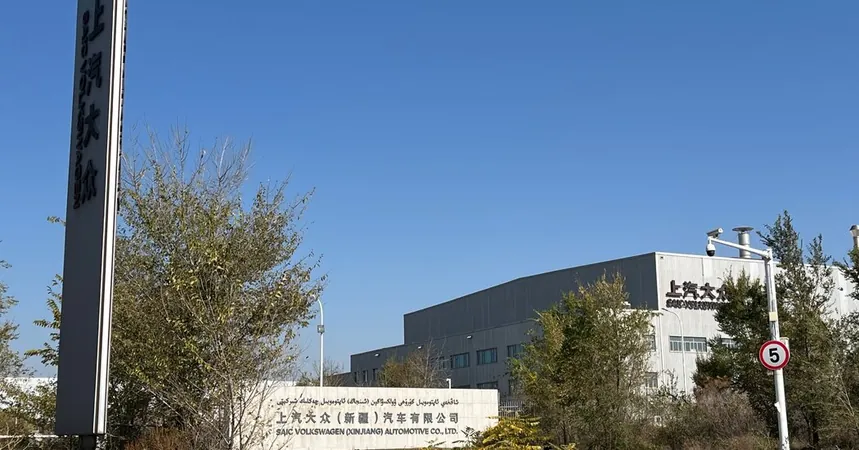
Volkswagen Bows Out of Xinjiang After 12 Years: What You Need to Know!
2024-11-28
Author: Chun
Volkswagen Divests from Xinjiang
In a significant move, Volkswagen announced on Wednesday that it would divest from its joint venture interests in the Xinjiang region of northwestern China. This region has recently become notorious due to the Chinese government's clampdown on predominantly Muslim ethnic groups, particularly the Uyghurs.
Volkswagen's Presence in Xinjiang
Volkswagen operated a prominent assembly plant in Urumqi, the regional capital, along with two test tracks—marking the largest and most prominent presence of any multinational company in Xinjiang. However, this presence has faced intense scrutiny and criticism from human rights advocacy groups, especially as the U.S. and more European nations have cut off imports from Xinjiang given the allegations of forced labor.
Chinese Government Reaction
Although the Chinese government vehemently denies these allegations, it has been vigorously pressuring foreign companies to maintain operations in the region. In a related episode, the Chinese Ministry of Commerce announced an investigation into PVH Corp, which owns popular brands like Calvin Klein and Tommy Hilfiger, for allegedly not sourcing from Xinjiang.
Financial Burden of the Urumqi Plant
Volkswagen's withdrawal does not solely arise from political and ethical considerations; it has also become a financial burden. The Urumqi assembly plant was primarily designed for gasoline vehicles, but as China's market increasingly pivots towards electric vehicles, the facility has fallen behind. In fact, the plant has remained dormant since 2019, as electric models account for half of all car sales in China.
Competition and Market Pressure
Meanwhile, Volkswagen, which once dominated the Chinese automotive scene since 1983, has seen rivals like BYD, a Chinese electric vehicle manufacturer, surpass it in sales this year.
Current Operations at Urumqi Plant
Currently, the Urumqi assembly plant employs just 175 workers, responsible for final car preparations for delivery to dealerships in western China. However, the logistics of exporting from this remote plant have proven impractical due to its distance from coastal shipping ports and the limited market in nearby Central Asian countries.
Volkswagen's Broader Review
As Volkswagen weathers the storm of increased competition from burgeoning Chinese automobile manufacturers, the company is undergoing a broader review of its operations, not only in China but also in Germany. In response to this competitive challenge, Volkswagen has invested heavily, including a new complex in central China staffed by 3,000 engineers dedicated to electric vehicle development.
Future Plans in China
Although Volkswagen plans to continue its partnership with SAIC Motor in China until at least 2040, introducing at least eight new electric models by 2030, its decision to sever ties with Xinjiang marks a significant shift. Previously, the assembly plant was constructed to cater to the need for affordable vehicles in western China, and the company employed a substantial number of Uyghurs, a group that has faced longstanding discrimination.
Human Rights Concerns
The crackdown in Xinjiang began in earnest in 2014, leading to reports that as many as a million Uyghurs and other ethnic minorities were detained in re-education camps. These human rights violations have drawn widespread condemnation and have influenced international policies against imports from the region.
Volkswagen's Stance on Labor Practices
While Volkswagen has consistently denied claims of utilizing forced labor in Xinjiang, the auditing conducted last year to assess its compliance with international labor standards was met with skepticism, particularly regarding worker anonymity.
The Future of Volkswagen's Operations
As of February, Volkswagen had indicated that it was in “advanced talks” regarding its Xinjiang operations. However, as sales of traditional gasoline vehicles decline and human rights concerns grow, the Chinese government's pressure on multinational firms to remain has diminished.
Conclusion
This stepping back from Xinjiang signals a pivotal change in how global companies engage with regions under scrutiny for human rights issues, reinforcing the notion that ethical practices are becoming essential components of international business strategies. Watch closely as this situation develops—it could reshape the landscape for global corporations operating in politically sensitive areas!



 Brasil (PT)
Brasil (PT)
 Canada (EN)
Canada (EN)
 Chile (ES)
Chile (ES)
 España (ES)
España (ES)
 France (FR)
France (FR)
 Hong Kong (EN)
Hong Kong (EN)
 Italia (IT)
Italia (IT)
 日本 (JA)
日本 (JA)
 Magyarország (HU)
Magyarország (HU)
 Norge (NO)
Norge (NO)
 Polska (PL)
Polska (PL)
 Schweiz (DE)
Schweiz (DE)
 Singapore (EN)
Singapore (EN)
 Sverige (SV)
Sverige (SV)
 Suomi (FI)
Suomi (FI)
 Türkiye (TR)
Türkiye (TR)